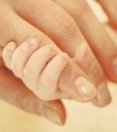Arthrogryposis
A group of conditions characterized by congenital joint contractures due to decreased fetal movement.
Arthrogryposis refers to a group of disorders characterized by immobility and contractures of one or more joints that are present at birth. The condition may be caused by underlying abnormalities of the nervous system, muscles, or connective tissues, or by limitations to movement while in the uterus.
Arthrogryposis has been described as a feature of numerous syndromes, including congenital myasthenia gravis, perinatal lethal Gaucher disease, and Freeman–Sheldon syndrome, among many others. Some forms affect nearly all of the major joints, while other forms involve primarily the hands and feet (distal arthrogryposis). The course and outcome of the disorder depend on the underlying cause, the presence of associated anomalies, and normal development of the lungs.
Amyoplasia (arthrogryposis multiplex congenita) accounts for more than 40% of children with arthrogryposis. Although these infants usually require orthopedic and rehabilitative interventions throughout childhood, their functional outcome in both physical and educational areas is often excellent. Amyoplasia is typically a sporadic condition.
About one-third of children born with arthrogryposis have a severe or lethal form of Pena–Shokeir phenotype or lethal multiple pterygium syndrome. These infants usually do not survive beyond the neonatal period. Pena–Shokeir syndrome and lethal multiple pterygium syndrome are often inherited as autosomal recessive traits.
Prenatal ultrasound findings may include increased amniotic fluid, decreased fetal movement, fixed flexion deformities, knocked knees, clubfeet, and hand contractures.
The risk of recurrence is approximately:
- ~1% for sporadic cases
- 25% if arthrogryposis is associated with an autosomal recessive cause
- 50% if inherited as an autosomal dominant trait
- 50% of males affected if the condition is inherited as an X-linked recessive disorder
When the specific diagnosis is unknown, there is an estimated 5% chance that another child will be born with the same condition or that an affected adult will have an affected child.
